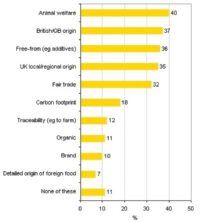 New research from Mintel finds animal welfare tops the nations food concerns, with as many as four in ten (40%) Brits ranking animal welfare as one of their key food concerns.
New research from Mintel finds animal welfare tops the nations food concerns, with as many as four in ten (40%) Brits ranking animal welfare as one of their key food concerns.
Meanwhile, British (37%) and local (35%) origin and food purity (36%), ie being additive free, are all deemed important by more than one in three people.
Interestingly, some issues that previously enjoyed a high profile, such as carbon footprint (18%) and organic (11%), have lost their mainstream appeal, now seen as key by fewer than one in six people.
Although animal welfare tops Britain’s food concerns, no single food issue currently chimes with the whole population, or even with the majority, views on what matters when it comes to food remaining fragmented.
In terms of demographics, animal welfare is particularly close to the hearts of women (46%) as opposed to just (34%) of men. Meanwhile the over 55s are the most committed to the origin of food (47%) versus just (20%) of 16-24 year olds.
Looking at food origin, as many as half the population see food origin information as important, but just one in three pay attention to it.
One in three (35%) see food origin labelling as sometimes misleading, yet fewer than one in six (15%) look for the Red Tractor label, indicating a need for assurance schemes to build greater awareness and trust.
For almost a quarter (27%) of Brits, price is more important than food origin, while around the same number (26%) don’t pay much attention to food origin.
Two in five people buy British to support local business (40%), but less than one in five (19%) see it as worth paying more for, while four in ten (39%) expect British food to be cheaper. Consumers do not display total confidence in British food with just over a third (37%) saying they trust British food more than food from overseas. While only 17% believe British food tastes better, the same number (17%) feel it is expensive for what it is.
More than one in four (28%) people say there isn’t enough British food available in their local supermarket, underlining the need to highlight food origin in-store.
Just two million 16-24-year-olds see British origin of food as important. It is vital for the future of the sector to find ways to build rapport among the other five million who do not. High animal welfare could provide such as platform, as it is deemed important by three million 16-24-year-olds.
Finally, the report finds products highlighting their British credentials have gained share in NPD in the recession, though at 5% of all new product launches the share is still modest.




Comments are closed.